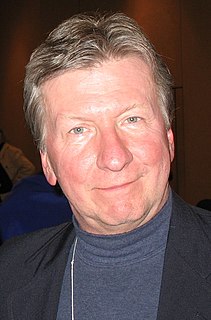A Quote by F. Paul Wilson
I don't know how it is with other writers, but most of the time when I finish [reading] a story or novel, I may be pleased, I may even be impressed, but somewhere in the back of my mind I'm thinking, I can do that.
Related Quotes
When I'm writing, I really want to satisfy myself. I've got a story that I am working on and struggling with, and I want to tell it the most effective way I can. That's really what I struggle with. And the thought of who may be reading it may be there somewhere in the back of my mind - I'll never say it's not there because I don't know - but it's not really what I'm thinking about.
I may not be funny. I may not be a singer. I may not be a damn seamstress. I may have diabetes. I may have really bad vision. I may have one leg. I may not know how to read. I may not know who the vice president is. I may technically be an alien of the state. I may have a Zune. I may not know Excel. I may be two 9-year-olds in a trench coat. I may not have full control of my bowels. I may drive a '94 Honda Civic. I may not “get” cameras. I may dye my hair with Hydrogen Peroxide. I may be afraid of trees. I may be on fire right now. But I'm a fierce queen.
In reading a novel, any novel, we have to know perfectly well that the whole thing is nonsense, and then, while reading, believe every word of it. Finally, when we're done with it, we may find - if it's a good novel - that we're a bit different from what we were before we read it, that we have changed a little... But it's very hard to say just what we learned, how we were changed.
I don’t ask writers about their work habits. I really don’t care. Joyce Carol Oates says somewhere that when writers ask each other what time they start working and when they finish and how much time they take for lunch, they’re actually trying to find out, "Is he as crazy as I am?" I don’t need that question answered.
But when I say it isn't meant for anyone's eyes, I don't mean it in the sense of one of those novel manuscripts people keep in a drawer, insisting they don't care if anyone else ever reads it or not.The people I have known who do that, I am convinced, have no faith in themselves as writers and know, deep down, that the novel is flawed, that they don't know how to tell the story, or they don't understand what the story is, or they haven't really got a story to tell. The manuscript in the drawer is the story.
I've always loved short stories. Even before I was a writer I was reading short stories - there were certain writers where I just felt like they could do in a short story what so many writers needed a whole novel to do, and that was really inspiring to me. Alice Munro, I felt that way about from an early time. Grace Paley.
Learn a lot about the world and finish things, even if it is just a short story. Finish it before you start something else. Finish it before you start rewriting it. That's really important.
It's to find out if you're going to be a writer or not, because that's one of the most important lessons.
Most, maybe 90% of people, will start writing and never finish what they started. If you want to be a writer that's the hardest and most important lesson: Finish it. Then go back to fix it.
I believe you have to write every day–make the time. It’s about having an organized mind instead of a chaotic and untidy one. There is a myth that writers are bohemian and do what they like in their own way. Real writers are the most organized people on the planet. You have to be. You’re doing the work and running your own business as well. It’s an incredibly organized state. [Also reading]…one of the things reading does do is discipline your mind. There are no writers who are not readers.
I read continually and don't understand writers who say they don't read while working on a book. For a start, a book takes me about two years to write, so there's no way I am depriving myself of reading during that time. Another thing is that reading other writers is continually inspiring - reading great writers reminds you how hard you have to work.
Even the most incorrigible maverick has to be born somewhere. He may leave the group that produced him-he may be forced to-but nothing will efface his origins, the marks of which he carries with him everywhere. I think it is important to know this and even find it a matter for rejoicing, as the strongest people do, regardless of their station. On this acceptance, literally, the life of a writer depends.

































